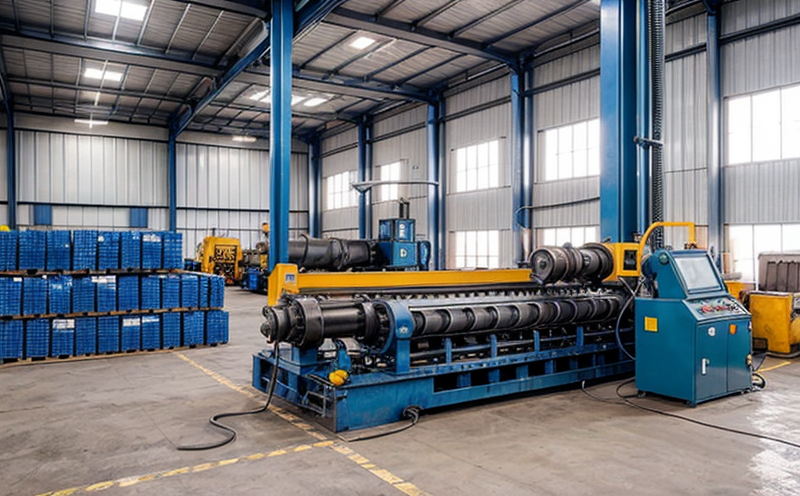ISO 11161 Integrated Manufacturing Systems Safety Testing
The ISO 11161 standard provides a framework for the safety assessment of integrated manufacturing systems (IMS) used in industrial environments. These systems are increasingly critical components in modern factories, combining multiple machine tools and robotic arms with automated control systems to optimize production processes. The safety testing outlined by this standard ensures that these complex systems operate without posing risks to personnel or causing damage to equipment.
The ISO 11161 protocol covers a range of tests designed to evaluate the safety features of IMS. It includes evaluations for emergency stop mechanisms, operator interfaces, and the overall system architecture. The tests are comprehensive and consider both static and dynamic conditions under which the systems might operate. This ensures that any potential hazards are identified early in the manufacturing process.
For quality managers and compliance officers, ISO 11161 safety testing is essential for ensuring regulatory compliance with international standards like ISO 42540:2018, which specifically addresses the design of automated production systems. This standard helps prevent accidents by identifying potential risks early in the development cycle.
R&D engineers benefit from this testing as it provides a roadmap to improve system reliability and safety. By adhering to these standards during the design phase, they can minimize the need for costly redesigns later on. Procurement teams also see significant advantages; they can ensure that the components they source are not only reliable but also compliant with global safety protocols.
The testing process typically involves multiple stages. Initially, a detailed risk assessment is conducted to identify all potential hazards associated with the IMS in question. Following this, specific tests are carried out using standardized test procedures as defined by ISO 11161. These might include functional tests on emergency stop mechanisms and operator interfaces.
Once testing is complete, detailed reports are generated that summarize findings from each stage of the assessment process. Compliance officers can use these reports to ensure ongoing adherence to safety standards throughout the life cycle of an IMS project. Additionally, R&D teams receive valuable insights into areas where improvements could be made for future iterations or similar projects.
Overall, ISO 11161 integrated manufacturing systems safety testing plays a crucial role in safeguarding personnel and property within industrial settings while facilitating smoother operations by reducing downtime due to unforeseen malfunctions. By leveraging this standard, organizations can enhance their reputation as leaders in safe and efficient production practices.
Why It Matters
The importance of ISO 11161 integrated manufacturing systems safety testing cannot be overstated, especially given the growing complexity of modern industrial operations. As machines become more sophisticated and interconnected, so too does their potential for causing harm if not properly managed.
- Reduces risk: By identifying hazards early on, this testing helps prevent accidents that could lead to injuries or fatalities.
- Avoids compliance issues: Ensuring adherence to international standards like ISO 1161 prevents legal penalties and reputational damage associated with non-compliance.
- Enhances reputation: Demonstrating a commitment to safety can enhance an organization's image, attracting more customers and partners.
- Improves efficiency: Reliable IMS systems reduce downtime through better maintenance practices informed by thorough testing.
Incorporating these tests into your quality assurance protocols ensures not only regulatory compliance but also contributes positively towards creating safer workplaces. This ultimately leads to higher productivity levels across all departments within an organization.
Why Choose This Test
- Comprehensive Coverage: ISO 11161 covers a wide range of safety aspects, ensuring that no potential hazard goes unnoticed.
- International Standards Compliance: By aligning with globally recognized standards, you demonstrate your commitment to best practices and regulatory compliance.
- Early Identification of Risks: Testing early in the development cycle allows for necessary adjustments before costly redesigns are required.
- Improved Reliability: Reliable IMS systems contribute significantly to overall operational efficiency by minimizing downtime caused by malfunctions.
Choosing ISO 11161 integrated manufacturing systems safety testing ensures that you meet the highest standards of safety and reliability, contributing to a safer work environment and enhanced reputation for your organization.
Competitive Advantage and Market Impact
The implementation of ISO 11161 integrated manufacturing systems safety testing offers several competitive advantages that can significantly impact market positioning. Firstly, it positions your company as a leader in safety and compliance within the industry, which is increasingly becoming a key factor for customers when choosing suppliers or partners.
By ensuring all IMS components meet stringent safety criteria, you reduce the likelihood of incidents occurring during operation, thereby improving customer trust and satisfaction. This can translate into increased market share as satisfied customers are more likely to recommend your products or services to others.
In addition, compliance with these standards demonstrates your commitment to sustainability and ethical practices, which resonate well with modern consumers who prioritize responsible business conduct. This aligns with broader trends towards corporate social responsibility (CSR), further enhancing your brand image among environmentally conscious stakeholders.
Moreover, demonstrating technical expertise through rigorous testing can set you apart from competitors who may not have made similar investments in safety protocols. It shows that you are ahead of the curve in terms of innovation and commitment to excellence, which can be a powerful differentiator in competitive markets.
The overall effect is twofold: not only do you gain a strategic advantage over competitors but also create long-term value for your organization by fostering loyalty among customers while maintaining regulatory compliance. This dual benefit ultimately contributes to sustainable growth and success within the market.





